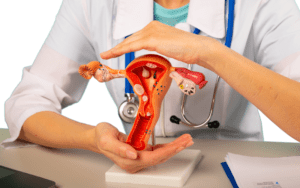PCOD Problem in Females: Causes, Symptoms, and Effective Solutions
Introduction
Polycystic Ovarian Disease (PCOD) is one of the most common hormonal disorders affecting females of reproductive age. It can lead to a variety of health challenges, including irregular periods, weight gain, and even infertility. Understanding PCOD, its causes, and its treatment is critical for maintaining overall health and well-being.
At “Mom and More” clinic, led by the esteemed Dr. Yasmin Imdad, women receive comprehensive care tailored to manage and treat PCOD effectively. In this blog, we delve into the causes, symptoms, and solutions for this prevalent condition to help you make informed decisions.
What is PCOD?
Polycystic Ovarian Disease, often abbreviated as PCOD, is a condition where the ovaries produce an abnormal amount of androgens, male hormones typically present in small amounts in females. This leads to the formation of multiple tiny cysts in the ovaries, disrupting ovulation and hormone balance.
PCOD is not just a reproductive issue; it impacts metabolic, hormonal, and psychological health, making early awareness and treatment crucial.

Causes of PCOD in Females
Several factors contribute to the development of PCOD, including:
- Genetic Factors: Women with a family history of PCOD are more likely to develop the condition.
- Lifestyle Habits: Poor diet, physical inactivity, and high-stress levels can exacerbate hormonal imbalances.
- Hormonal Imbalances: Excess insulin and high levels of androgens interfere with ovarian function.
- Medical Conditions: Conditions like hypothyroidism or obesity are often linked to PCOD.
Understanding these causes is the first step in effective management.
Symptoms of PCOD Problem in Females
PCOD manifests through a range of symptoms, which may vary in severity. The most common ones include:
- Irregular Menstrual Cycles: Long or infrequent periods.
- Excessive Hair Growth: Particularly on the face and body (hirsutism).
- Acne and Skin Issues: Persistent breakouts and oily skin.
- Weight Fluctuations: Difficulty losing weight or unexplained weight gain.
- Mood Changes: Anxiety, depression, or fatigue are commonly reported.
Recognizing these symptoms early can prevent complications and improve outcomes.
How PCOD is Diagnosed?
Diagnosing PCOD involves a combination of clinical evaluation and diagnostic tests:
- Blood Tests: To assess hormone levels, blood sugar, and lipid profile.
- Ultrasound: Imaging of the ovaries to detect cysts and assess their size.
- Symptom Evaluation: A detailed review of menstrual history and physical symptoms.
If you suspect PCOD, consult an expert like Dr. Yasmin Imdad at Mom and More for a precise diagnosis.
Impact of Untreated PCOD
Ignoring PCOD can lead to significant health risks, such as:
- Infertility: Disrupted ovulation affects the chances of conceiving.
- Diabetes: Insulin resistance increases the risk of type 2 diabetes.
- Heart Disease: Elevated cholesterol levels and obesity contribute to cardiovascular problems.
- Mental Health Issues: Anxiety and depression are common in untreated PCOD.
Addressing PCOD promptly prevents these complications and enhances quality of life.
Treatment of PCOD Problem in Females
Managing PCOD involves a combination of lifestyle changes, medical interventions, and natural remedies.
a. Lifestyle Modifications
- Dietary Changes: Incorporate low-carb, anti-inflammatory foods such as whole grains, lean proteins, and vegetables.
- Exercise: Regular physical activity helps regulate insulin levels and reduce weight.
- Stress Management: Yoga, meditation, and mindfulness exercises can alleviate stress-induced hormonal fluctuations.
b. Medical Treatments
- Hormonal Therapy: Birth control pills or progestins to regulate menstrual cycles.
- Metformin: Commonly prescribed to improve insulin sensitivity.
- Fertility Treatments: For women trying to conceive, ovulation-stimulating drugs may be recommended.
Dr. Yasmin Imdad and her team at Mom and More provide individualized treatment plans to ensure optimal results.
c. Natural and Holistic Solutions
- Herbal Remedies: Certain herbs like spearmint and cinnamon have shown potential benefits in reducing symptoms.
- Acupuncture: Some studies suggest acupuncture helps regulate hormones and improve ovarian function.
Tips to Prevent PCOD or Manage its Symptoms
- Maintain a healthy weight through a balanced diet and exercise.
- Avoid excessive sugar and processed foods to control insulin resistance.
- Stay hydrated and focus on nutrient-rich foods.
- Monitor your menstrual cycle and consult a doctor if irregularities occur.
- Regular health check-ups can catch early signs and prevent complications.
Why Choose “Mom and More” Clinic and Dr. Yasmin Imdad?
At Mom and More, women’s health is prioritized with a compassionate, patient-centered approach. Dr. Yasmin Imdad, a leading expert in gynecology, specializes in managing PCOD with evidence-based solutions. Whether you require lifestyle guidance, medication, or advanced fertility treatments, the team ensures holistic care tailored to your needs.
Conclusion
PCOD is a manageable condition when addressed with the right knowledge and care. By understanding its causes, recognizing symptoms, and adopting effective treatments, you can take control of your health. If you or someone you know is struggling with PCOD, don’t hesitate to consult Dr. Yasmin Imdad at Mom and More clinic. Your health is in expert hands.